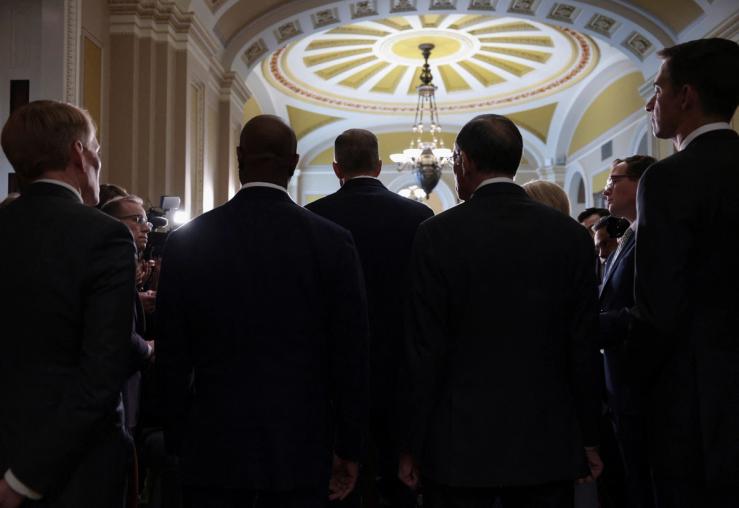The News
Senators are actively discussing a deal that would reopen the government, including hashing out a new stopgap funding bill that would last at least until December — and possibly beyond.
After forcing Democrats to vote on the House’s short-term bill 13 times over the past 6 weeks, Senate Majority Leader John Thune acknowledged the legislation no longer helps the current crisis because it expires on Nov. 21, leaving little time for progress on full-year spending bills. The Senate hasn’t voted on that bill since Oct. 28.
Now, the South Dakota Republican told reporters, his goal is to send something “back to the House that would open up the government.”
It’s a nod to reality after 34 days of fruitless positioning during the shutdown, but an important one that will allow the Senate to now take the lead. Inevitably, the result of the Senate talks will force House Republicans to end their six-week absence from Washington.
“We’re going to need to extend the date,” Senate Majority Whip John Barrasso told Semafor. “The current [continuing resolution] goes to Nov. 21, and today’s the third. So we need to go beyond that.”
Another sure sign of the seriousness in the Senate: Republicans are battling over where to land. Conservatives want the continuing resolution to extend until Jan. 15 to avoid a pre-Christmas deal with Democrats, but Senate Appropriations Chair Susan Collins, R-Maine, said she wants the spending bill to expire on Dec. 19.
Collins’ fear is that a longer stopgap bill could drain momentum for spending talks and lead to a full-year continuing resolution, which would be a disaster for congressional appropriators but supported by many conservatives.
A shorter funding patch would also give Democrats another leverage point if they don’t see progress on their top priority, an extension of enhanced tax credits for health insurance premiums.
“It’s meaningful that we’re having discussions about what the date really will be when we reopen the government. Because Nov. 21 for an end date for a CR doesn’t make a ton of sense to anybody,” said Sen. Mark Kelly, D-Ariz.
“I would like to see something that works for us to continue to work on this problem of health care costs in a meaningful way,” Kelly added. “And also get those House members back here.”
The endpoint of a new stopgap bill is only one in a complex series of connected issues that need to be addressed in order to reopen the government over the next week, and several senators cautioned that any agreement is still up in the air. Many members in both parties support passing regular spending bills instead of governing by stopgap bills, but the health care subsidies remain a huge sticking point.
Thune is willing to offer a vote on extending the health insurance subsidies, but Democrats say they want more given the possibility that such a vote would fall to a filibuster.
Sen. Jacky Rosen, D-Nev., has pitched a working group of senators that would write their own product for consideration on the floor.
“I sense that people are tired of this shutdown, but we’re still stuck with this premise of what we’re going to do about health care,” said Senate Minority Whip Dick Durbin, D-Ill.
Still, there’s no question that many lawmakers feel far closer to reopening the government than they did a week ago.
“We have made some progress over the weekend,” Collins said. “It just feels better this week. Now, who knows: It could all fall apart again.”
In this article:
Know More
Collins cited the biting effects of the shutdown as a critical motivation for negotiators: Food aid payments and other government benefits expired over the weekend, sending states scrambling to address the shortfalls as the Trump administration makes partial payments.
In addition, flight delays are beginning to cascade across the country as government workers go without paychecks.
“We’re having lots of active conversations about ending the shutdown,” said Sen. Elissa Slotkin, D-Mich.
By Tuesday evening, the off-year elections will also be over, clearing the calendar of any imminent political calculations. And the widespread agreement on the futility of the House-passed stopgap bill is prompting new waves of optimism.
“I think we’ve got a real shot. I’m hopeful,” said Sen. John Hoeven, R-N.D.
Room for Disagreement
The expiring enhanced health care subsidies prompted Democrats’ push to shut down the government. And those tax credits’ fate is going to weigh heavily on their votes to reopen it.
Without a clean path toward getting Trump’s signature on a law extending those health care benefits, many Democrats will struggle to support a shutdown agreement.
“The American people want us to fight for them. Shutdowns hurt, but the pain I just heard in Florida is going to be worse than anything happening with a shutdown. Because when those premiums go up by 100, 200%, people’s lives are ruined. People will die,” said Sen. Chris Murphy, D-Conn., who traveled to New Jersey and Florida over the past few days.
“My sense is, people want us to fight,” he added. “People see the real-life consequences of us failing in our fight to get these premium increases stopped.”
Burgess’s view
It’s still a long road to ending the shutdown, but many Democrats are sick of it and pursuing an exit strategy.
And Republicans’ move to negotiate a new end date for the stopgap spending bill is a substantive step toward a deal because it invites bipartisan input, rather than forcing Democrats again to vote on something they have repeatedly rejected.
Notable
- The Trump administration will provide half the usual food aid in November, CNN reports.


